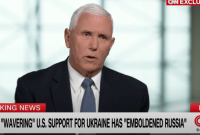The Trump administration is urging the United Nations, relief agencies, and American allies to join an Israeli proposal aimed at restarting the provision of restricted humanitarian aid in Gaza. This would occur under terms that grant Jerusalem strict oversight over these efforts, as reported by aid officials and others privy to ongoing talks.
As the United Nations along with almost every other organization has declined to join due to concerns over violations of “basic humanitarian principles” and breaches of international law, the U.S. initiative stands out alone.
The UN coordinator’s office for humanitarian affairs officially announced this stance in a document shared with assistance providers within the past day. The statement noted, following “careful deliberation, consultations, and examination,” that they collectively decided against engaging with this approach.
The comment elicited a severe reaction from Israel. On Wednesday, when addressing journalists, Danny Danon, who serves as Israel’s Ambassador to the UN, stated, “Instead of attempting to converse with us or striving to comprehend the proposed idea… the UN chose to release a statement indicating their decision not to participate.”
Danon echoed Israel’s claims, which have been strongly contested by numerous aid groups and U.S. authorities, alleging that Hamas has been involved in “large-scale theft of humanitarian assistance.” He stated that both the United Nations and Secretary-General António Guterres opted not to intervene.
President Donald Trump’s Middle East representative, Steve Witkow, convened with U.N. Security Council representatives at the U.S. embassy within the United Nations complex on Wednesday to talk about the Gaza initiative. In recent times, the government has conducted several discussions with assistance agencies engaged in providing support for those affected in Gaza. Additionally, European-based aid groups were extended an invitation to meet with American diplomats in Geneva on Thursday, according to sources familiar with these arrangements.
Administration officials declined to comment on efforts to gain approval for the Israeli aid proposal. Trump said Monday that people in Gaza “are starving and we are going to help them get some food.”
Trump, who said during his presidential campaign that he would bring a quick end to the Gaza crisis, plans to travel to Saudi Arabia, Qatar and the United Arab Emirates next week. On Wednesday, he told reporters to expect a major announcement on Gaza “probably in the next 24 hours.”
Israel declared a blockade on Gaza after the collapse of a brief ceasefire in March. No food or other supplies have been allowed to enter the enclave for two months. Under its newly formulated plan, a limited amount of supplies would be vetted by Israel and allowed to travel along designated corridors to Israeli-constructed distribution hubs. Both the corridors and the hubs are to be guarded by private U.S. security contractors.
The initiative is designed to depend on the United Nations — and particularly the U.N. World Food Program — and humanitarian nongovernmental organizations already working in Gaza to distribute food packets at the hubs to Israeli-vetted Palestinians.
The program is to be administered by an umbrella organization called the Gaza Humanitarian Foundation, a nonprofit newly registered in Switzerland that has been set up by unnamed governments and entities to funnel money into the effort, including paying the American security contractors.
A statement from the Geneva-based organization released on Wednesday did not include details regarding its source, supporters, or connection to Israel. “GHF was set up to reinstate that crucial support system using an independent and thoroughly audited approach that ensures aid reaches solely—and exclusively—those who require it.”
The primary objective is to establish four ” secure distribution centers,” each designed to cater to 300,000 individuals, aiming to initially provide for 1.2 million residents of Gaza, with plans to eventually extend coverage to over 2 million people. The statement also noted that Israeli Defense Force members will not be stationed close to these distribution points.
“Aid distribution is based solely on need — without eligibility requirements or regard to identity, origin, or affiliation — prioritizing community dignity and safety,” the statement said.
However, non-governmental aid groups and individuals acquainted with the Israeli strategies mentioned that the magnitude and stipulations outlined significantly deviated from what had been communicated regarding the early phases of the initiative. This phase aimed at screening applicants and providing assistance to less than 200,000 individuals.
The aid distribution will serve only southern Gaza, where a new Israeli military strategy, separately approved by Prime Minister Benjamin Netanyahu’s security cabinet over the weekend, plans to relocate most of Gaza’s more than 2 million people while it escalates operations against what it says are Hamas militants still operating in the enclave.
It’s not a test,” stated an individual acquainted with Israeli strategies. “This is where the populace will ultimately reside.
In recent weeks, as food storage facilities have run dry and instances of severe malnutrition have surged, multiple relief agencies have ceased their activities in Gaza.
The Washington-based nonprofit World CentralKitchen (WCK), led by renowned international Chef José Andrés, declared onWednesday that they “no longer possess sufficient provisions to preparemeals and bake bread in Gaza.” According to WCK, their lorries filledwith food items and cooking fuels have been parked at the Gazanborder since early March; however, “we can’t proceed with our crucialwork without receiving authorization from Israel for these reliefsupplies to be admitted into the region.”
Erin Gore, the Chief Executive Officer of WCK, stated during an interview on Wednesday that her organization refused to participate in the Israeli proposal alongside the United Nations and various groups. “This contradicts our humanitarian values,” Gore explained. “We cannot support initiatives that prevent dignified feeding.” A high-ranking representative from WCK also mentioned that this stance was conveyed to the Trump administration through discussions held at the State Department.
When asked about US efforts to encourage participation in Israel’s program, a representative from the World Food Programme—which continues as a significant recipient of American funding even after reductions implemented by the Trump administration—pointed towards UN declarations dismissing the proposal.
I believe the WFP is experiencing the most difficult time,” stated an official from a European aid organization. “Their entire U.S.-based global funding is at risk.







